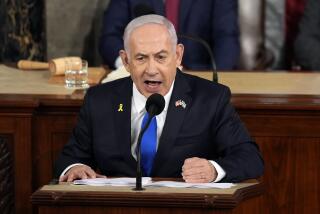Besieging Forces Give Russia Lawmakers an Earful
- Share via
MOSCOW — The most powerful weapon in the huge arsenal arrayed outside the Russian Parliament building Friday was the loudspeaker atop a yellow armored personnel carrier parked just outside the barricades.
At a volume that made eardrums throb and fillings vibrate, the yellow bellower shrieked out demands that defiant lawmakers and their supporters--opponents of President Boris N. Yeltsin--lay down their arms.
Then, as if the Yeltsin camp had taken a primer from the U.S. troops who tried to drive Panamanian leader Manuel A. Noriega to surrender by blasting him with rock music, the bad vibrations began: earsplitting Russian rap, treacly torch songs and a drinking ballad extolling the virtues of “Russian vodka, black bread and herring.”
“It’s good to have fun drinking, but it’s tough when you get a headache,” the loudspeaker blared, as if to reinforce allegations by Yeltsin’s men that some of the armed defenders of the Parliament building, known as the White House, are mentally disturbed or drunk.
Irritating as it may have been to several thousand pro-Yeltsin troops blockading the White House, inside the massive Soviet-era marble fortress the music was barely audible.
Contrary to reports from the Yeltsin camp and the Russian media, the defiant lawmakers showed no signs of softening on Day 11 of their confrontation with “dictator Yeltsin, the former president,” as rebellious Parliament Chairman Ruslan I. Khasbulatov called his former ally Friday.
Angry, isolated and convinced that most of the Russian regions support them, the bellicose lawmakers Friday morning rejected a preliminary agreement worked out by several of their leaders.
With a unanimity rare in Russian politics, in interviews Friday lawmakers and the armed paramilitary troops supporting them categorically rejected any compromise that would entail laying down their weapons before government troops end their blockade and withdraw from the White House.
They also insisted that they have enough food, water, weapons and willpower to withstand a long siege.
“How can we talk to a man who has set up a political concentration camp in downtown Moscow?” said Vice President Alexander V. Rutskoi.
The mustachioed Afghan War hero, whom Parliament has appointed “acting president,” looked surprisingly well rested and well dressed Friday in a crisp shirt and a stylish gray-and-white sweater.
“I am far from being physically tired,” Rutskoi told reporters in the chilly corridor outside his makeshift office, adding that his Russian military training was much more taxing than the current siege.
But Rutskoi said he was “morally tired” from seeing demonstrators beaten by riot police. He said Parliament sympathizers are recording the radio channels on which police are issuing orders to beat demonstrators, and he warned, “The time will come when we will hold those who gave the orders responsible.”
After more than a week of darkness, some of the lights came on in the White House on Friday, and cold water was running. A handful of telephones were reportedly able to receive incoming calls, but all outgoing calls remained blocked.
Heat and hot water were promised but never materialized. Nevertheless, people quickly flushed toilets, filled sinks with water and sponge-bathed in restroom basins. Small crowds formed around television sets.
Altai N. Piche-Ool, a Supreme Soviet member from Tuva on the Mongolian border, blamed media censorship for the widespread public indifference to Parliament’s plight.
In what now appears to be an article of faith among those remaining in the White House, Piche-Ool predicted that Russia’s far-flung regions would support Parliament--and win.
All of Moscow’s heat and most of its electricity is generated with natural gas. If the regions stop shipping the gas, as some Siberian areas have already threatened, “The people who reign here (in Moscow) will have to meet some of their terms,” the 47-year-old former teacher said.
Armed guards outside the White House, displaying the overt anti-Semitism that has surfaced during the crisis, agreed to let reporters into the building provided “you’re not from the Jerusalem Post.”
White House graffiti branded Yeltsin and Foreign Minister Andrei V. Kozyrev with the ugliest anti-Jewish epithets in the Russian language.
Piche-Ool scornfully dismissed the “treachery” of the lawmakers who had joined the Yeltsin camp by declaring that “the majority of those who left are Jews.”
Anti-American sentiment is also rampant. “Yeltsin is a zombie working for the U.S.A.,” read one sign plastered to the White House. Guards with Kalashnikov rifles, on learning that reporters were American, demanded to know how they would react if President Clinton dissolved Congress.
Others wanted to know whether it was true that the U.S. Congress had sided with the Russian Parliament against Yeltsin. Vladimir V. Milko shook his head in sad disbelief that “in the States, people seem to consider this neo-Bolshevik Yeltsin a democrat.”
More to Read
Sign up for Essential California
The most important California stories and recommendations in your inbox every morning.
You may occasionally receive promotional content from the Los Angeles Times.










